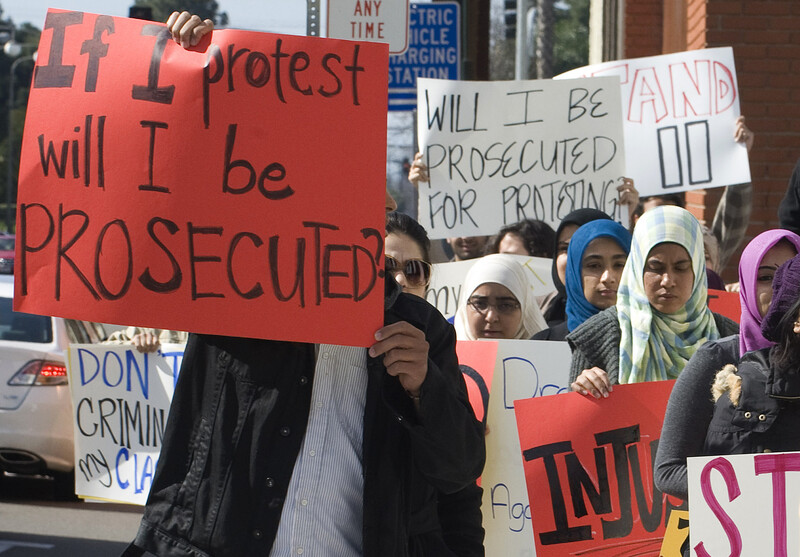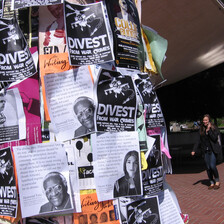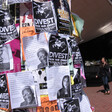The Electronic Intifada Berkeley 6 January 2012

Lawsuits and criminal trials have threatened the free speech rights of California campus solidarity activists.
ZUMA Press/NewscomA lawsuit over alleged anti-Semitism at the University of California Berkeley has been dismissed in its preliminary stages.
The case was dismissed after a district judge determined that students had accused the university’s administrators of allowing an “anti-Semitic climate” to develop on campus failed to support their claims.
On 22 December in San Francisco, US District Judge Richard Seeborg ruled in favor of a motion to dismiss the lawsuit. In his ruling, Seeborg stated that “plaintiffs have failed to allege facts supporting a claim that defendants have violated plaintiffs’ legal or other constitutional rights or that they have legal duty to take further action to control the conduct of other persons.”
The lawsuit, which was filed on 18 May 2011 by Jessica Felber, a 2010 UC Berkeley graduate, and Brian Maissy, a current UC Berkeley student, and members of UC Berkeley’s Zionist student organization Tikvah, alleged that the activities of Students for Justice in Palestine (SJP) and the Muslim Student Association (MSA) “threaten and endanger the health and safety of the University of California’s Jewish Students.”
The plaintiffs referred to the MSA, SJP and the Muslim Student Union (MSU) — an organization that actually does not exist on UC Berkeley’s campus — as “the anti-Semitic/anti-Israel MSA, SJP and MSU.”
The centerpiece of the suit was an incident that Felber claimed to have occurred in March 2010. Felber alleged that an SJP member rammed into her with a shopping cart as she demonstrated on the campus’ well-known protest area, Sproul Plaza, during “Israeli Peace and Diversity Week.” The suit went on to invoke a long list of other supposedly similar or related incidents in which the MSA, SJP and other Muslim student organizations from other UC campuses allegedly committed acts of violence and harassed Jewish students and individuals.
No coherent or plausible argument
The lawsuit was dismissed during the motion to dismiss phase, in which the judge rules on the assumption that all information presented by the plaintiff is true, requiring no discussion or investigation of the accuracy of the plaintiffs’ claims.
A portion of the lawsuit was examined under the First Amendment of the US Constitution. Seeborg stated in his ruling that nothing in the complaint “shows any deprivation of plaintiffs’ ‘freedom of assembly’ at all. Additionally, from the facts presently alleged, it is far from clear that any person interfered with plaintiffs’ free exercise of religion.”
The judge added, “some courts have allowed public colleges to outlaw harassing speech and conduct that interferes with students’ rights, but schools have no legal duty to do so” (“UC Berkeley students’ anti-Semitism suit dismissed,” San Francisco Chronicle, 26 December 2011).
Another portion of the claims are brought under Title VI of the Civil Rights Act. These claims were also dismissed though Seeborg’s ruling allows plaintiffs twenty days to amend (until 11 January 2012). Seeborg’s ruling explains that plaintiffs’ claims fail to show that the events presented in the complaint had indeed interfered with students’ access to educational services.
Overall, the ruling reveals the completely ludicrous nature of the complaint and its frivolous use of the law. However, since the litigation excludes MSA and SJP as defendants in the suit, the organizations are provided no opportunity to respond to the allegations made against them.
Propagating false allegations
In general, the complaint links together the activities of all Muslim student groups as well as California SJP and SJP-National together as if the groups are officially and strategically coordinated with one another. The suit lists occurrences on the UC Berkeley campus alongside incidents on several other University of California campuses as evidence of the administration’s encouragement of SJP and MSA’s “campus terrorist incitements.”
In the official complaint, the plaintiffs claim that the alleged incident in which Felber was assaulted by an SJP member on Sproul Plaza was the product of the defendants’ failure to “effectively discipline the MSA and SJP for their pro-terrorist programs, goals and conduct” on the UC Berkeley campus as well as across the UC system. The complaint repeatedly refers to “the SJP, MSA and MSU,” claiming that the MSA is also known as the MSU, when in fact, there is no official strategic coordination between different chapters of the MSA or MSU nationally.
This tactic of mis-naming and mis-grouping sought to blur the lines of national, cultural, religious, ideological and political association to the end of constructing an imaginary rivalry between Muslims (used in the lawsuit as a “catch-all” including Palestinian solidarity activists of all backgrounds, all people of “Middle Eastern” origin, Muslims of all ranges of religiosity) and Jews.
In the context of this fabricated rivalry, all criticism of Israeli policy is anti-Semitic and therefore illegitimate.
Additionally, the suit alleges that SJP is the “militant arm” of the MSA, while in fact there is no formal coordination between the two groups other than co-sponsorship of some campus events.
Myth vs. reality about student solidarity groups
SJP has close relationships with numerous progressive student groups. During Cal SJP’s “divestment drive” in the Spring of 2010, 43 student organizations signed on in official support of a student senate bill that sought to divest University funds from Israel.
Furthermore, SJP itself is not a “Palestinian activist group” as the complaint states. Its members are from a wide range of backgrounds, the majority of which are non-Arab and non-Muslim. In general, the leadership of SJP in the past five and a half years of its existence as a registered UC Berkeley student organization has reflected a majority of non-Arab and non-Muslim individuals, though the demographics shift from year to year.
The suit also conflates “Jewish” with “Zionist” in claiming that “anti-Zionist” equals “anti-Semitic,” disregarding the existence of the anti-Zionist Jewish voice — a voice that has been strong within SJP since its registration with the Associated Students of the University of California in the spring of 2005.
Of course, this abuse of the legal system in suppressing Palestinian solidarity activism both on and off university campuses is nothing new. Only after twenty years were charges against the Palestine solidarity activists dubbed the “LA 8” dropped for allegedly raising money for the Popular Front for the Liberation of Palestine.
In 2001, the US government used the courts to shut down the Holy Land Foundation, formerly the largest Muslim charity in the US, and the group’s founding members remain imprisoned on terrorism charges.
Dr. Sami al-Arian remains under house arrest to this day, awaiting a judge’s ruling on charges of criminal contempt based on his humanitarian relief and advocacy work.
And most recently, the court system has been used to convict a group of students at UC Irvine — known as the Irvine 11 — of conspiracy charges for exercising their most basic first amendment rights when they protested the speech of Israeli ambassador Michael Oren in February 2010.
Students not deterred
Despite intimidation, student groups across the country and the around world continue to speak out against injustices and repression at home and abroad. From the efforts of students to realize the Palestinian call for boycott, divestment and sanctions (BDS) to the Occupy movement within which the slogan “Occupy (fill in the blank), not Palestine” has arisen.
The endless list of demonstrations and victories for BDS and the Palestinian solidarity movement include numerous student campaigns and actions.
In May of 2010, DePaul University’s Student Government Association passed a resolution to replace Sabra hummus products with an alternative brand in campus dining halls. One co-owner of Sabra provides financial support and supplies to two Israeli military units implicated in human rights abuses, the Golani and Givati brigades.
On 26 October, 2011, a walk-out at the University of Michigan left 15 audience members in the room to hear a speech given by Israeli deputy consul Ishmael Khaldi. And in the UK, the National Union of Students unanimously passed a motion demanding an immediate end to King’s College London’s involvement in an EU-funded research project with the Israeli cosmetics firm Ahava in November of this year.
No less can be expected of university students across the globe in the Spring of 2012 with the upcoming 8th annual Israeli Apartheid Week (IAW), an action that gains presence on more campuses every year. In 2010, the first IAW was organized in the occupied West Bank.
As has been the case throughout history, students will remain at the forefront of movements for change despite attempts to discourage and brutalize. The Palestine solidarity movement is no exception.
Dalia Almarina is a Bay Area native. She is a recent alumnus of Cal Students for Justice in Palestine.
Tags
- University of California at Berkeley
- Berkeley
- zionism
- Students for Justice in Palestine
- Muslim Students Association (MSA)
- Muslim Student Union (MSU)
- anti-Zionism
- Holy Land 5
- Dr. Sami al-Arian
- Irvine 11
- occupy wall street
- BDS
- DePaul University
- University of Michigan
- King's College London
- Israeli Apartheid Week
- censorship
- academic freedom


